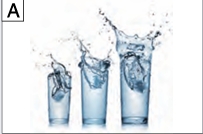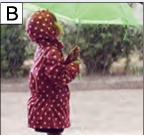热身 Warm-up
给下面的词语选择对应的图片 Match the pictures with the words/phrases.






课文 Text
1 在路上 On the road

A: Zuótiān Běijīng de tiānqì zěnyàng? 昨天 北京 的天气 怎么样?
B: Tài rè le. 太热了。
A: Míngtiān ne? Míngtiān tiānqì zěnyàng? 明天 呢? 明天 天气 怎么样?
B: Míngtiān tiānqì hěn hǎo, bù lěng bù rè. 明天 天气 很好,不冷不热。
New Words
1. 天气 tiānqì n. weather
2. 怎么样 zěnyàng pron. (indicating nature, condition or manner) how
3. 太 tài adv. too, excessively 太……了 tài……le too, extremely
4. 热 rè adj. hot
5. 冷 lěng adj. cold
English Version
A: How was the weather in Beijing yesterday?
B: It was too hot.
A: What about tomorrow? What will the weather be like tomorrow?
B: It will be fine, neither cold nor hot.

A: Jīntiān huì xià yǔ ma?
A: 今天 会下雨吗?
B: Jīntiān bú huì xià yǔ.
B: 今天 不会下雨。
A: Wáng xiǎojiě jīntiān huì lái ma?
A: 王 小姐 今天 会来吗?
B: Bú huì lái, tiānqì tài lěng le.
B: 不会来,天气太冷了。
A: Will it rain today?
B: No, it won’t rain.
A: Will Miss Wang come today?
B: No, she won’t. It’s too cold.
6. 下雨 xià yǔ to rain
下雨 xià v. (of rain, snow, etc.) to fall
yǔ n. rain
7. 小姐 xiǎojiě n. miss, young lady
8. 来 lái v. to come
A: Nǐ shēntǐ zěnmoyàng?
A: 你身体 怎么样?
B: Wǒ shēntǐ bú tài hǎo. Tiānqì tài rè le,
B: 我 身体不太好。天气太热了,
bú ài chī fàn.
不爱吃饭。
A: Nǐ duō chī xiē shuǐguǒ, duō hē shuǐ.
A: 你多 吃 些水果,多 喝水。
B: Xièxie nǐ, yīshēng.
B: 谢谢你,医生。

A: How are you?
B: Not very well. It’s too hot. I have no appetite.
A: Eat more fruit and drink more water.
B: Thank you, doctor.
* 9. 身体 shēntǐ n. body
10. 爱 ài v. to like, to love
11. 些 xiē m. some, a few
12. 水果 shuǐguǒ n. fruit
13. 水 shuǐ n. water
1 疑问代词 “怎么样” The Interrogative Pronoun “怎么样”
“怎么样” 用来询问状况。例如:
“怎么样” is used to ask about the condition of something or someone. For example:
- (1)你的汉语怎么样?
- (2)你妈妈身体怎么样?
- (3)明天天气怎么样?
2 主谓谓语句 Sentences with a Subject – Predicate Phrase as the Predicate
主谓谓语句中的谓语是一个主谓结构的短语,它的格式是:
In Chinese, there is such a kind of sentence in which the predicate is a subject – predicate phrase. The structure is:
| 全句主语+全句谓语 (主语+谓语) |
Subject of the Sentence + Predicate of the Sentence (Subject + Predicate) |
|
|---|---|---|
| Subject | Predicate | |
| Subject | Predicate | |
| 我 | 身体 | 不太好。 |
| 明天 | 天气 | 很好。 |
| 你 | 身体 | 怎么样? |
注意:全句谓语中的主语常常是全句主语的一部分或者跟它相关。
Note: The subject in the subject – predicate phrase is usually part of the subject of the sentence or related to it.
3 程度副词 “太” The Adverb “太”
副词 “太” 表示程度深的意义。用 “太” 的句尾常带 “了”。否定句不用 “了” 。例如:
The adverb “太” indicates a high degree. “了” is often used at the end of the sentences with “太”, but not in negative sentences. For example.
- (1)太热了。
- (2)天气太冷了。
- (3)我身体不太好。
4 能愿动词 “会”(2) The Modal Verb “会”(2)
“会” 在句中表示所说的情况有可能实现。例如:
“会” indicates the possibility of the situation mentioned. For example:
(1)A: 爸爸八点前会回家吗?
B: 会。
(2)A: 明天她会来吗?
B: 她会来。
(3)A: 今天会下雨吗?
B: 今天不会下雨。

Comments